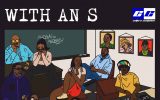by Rachel Ogbu//
Maggie Aderin-Pocock, 48, is the Nigerian-British Space scientist, space instrument designer and educator raising awareness about climate change and encouraging children especially girls to build interests in STEM subjects including Space Science. Through her company, she has been visiting schools – to give children a tour of the universe. “I have been trying to get out there and show people, show black kids, that to be a scientist isn’t an odd thing. Again it is these stereotypes – many kids will see black sports people, black singers, but they won’t see a black scientist and so they eliminate that from their hit list of things to do.”
Aderin-Pocock who was awarded an MBE in 2009 New Year’s Honours list for services to science education worked as a scientist on aircraft missile warning systems for the Defence Evaluation and Research Agency, UK Ministry of Defence. She has gone on to hang outside of aeroplanes taking images of missiles going underneath her while working on space satellites designed to collect data for climate research. “I suffer from dyslexia and was generally thought to be pretty dumb when I started school, so I was put in the remedial class,” she tells The Guardian. “I don’t think we’ll say climate change isn’t happening. But we might see it from a different perspective, perhaps a more human perspective, and therefore present the data in a different way or something.”
With a degree in Physics and a PhD in Mechanical Engineering, she’s worked on the 8m Gemini telescope in Chile, and the James Webb Space Telescope and has worked on instruments for the Aeolus satellite, which measure wind speeds to help the investigation of climate change.
Aderin-Pocock whose middle name is Ebunoluwa has been on TV after joining the team of the long-running BBC astronomy show Sky at Night in 2013. In 2013, Maggie Aderin-Pocock was honoured on the UK Power List as one of the UK top 10 most influential black people and in 2008 she received the Arthur C Clark Outreach Award for Promotion of Space (just to name a few).
“I was brought up in the late 1960s – born 1968 – and [in] 1969 people landed on the moon. I was born in that bubble of excitement, of people going out there and I always thought: when am I going out?”
“I still want to go. It’s my dream.”

Maggie Aderin-Pocock Photograph: Richard Saker for the Observer













